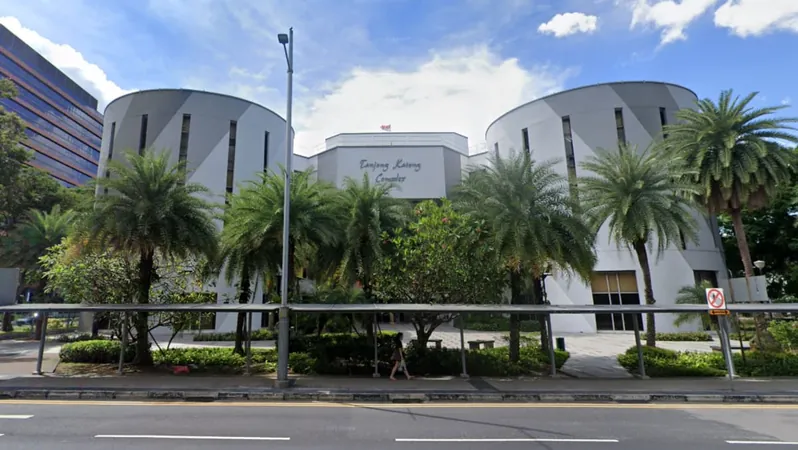
Tanjong Katong Complex: A Long-Awaited Revival for Malay Entrepreneurs
2024-10-31
Author: Nur
SINGAPORE: The heart of tradition lies within the walls of Tanjong Katong Complex, where Mr. Abu Bakar Abdullah Bagarib has nurtured his traditional Malay clothing business for over two decades. Since the mall's closure last year for renovations, which were originally slated to last three years, the landscape for local entrepreneurs has dramatically shifted. Mr. Bagarib, who predominantly serves the Malay-Muslim community, relocated his shop across the street to City Plaza, but his sales have plummeted by over 60%.
He shares a poignant sentiment regarding his struggles, especially as the price tags of festivities like Hari Raya loom closer. "The last Hari Raya sales were disappointing because traffic has significantly decreased here. I may have to consider leaving this new space if things don’t improve soon," the 71-year-old bemoaned. His concerns echo those of many former tenants, as the Singapore Land Authority (SLA) recently shifted gears, announcing a 30-year lease sale for the beloved complex.
The transformation of Tanjong Katong Complex is set to redefine the community's retail experience. The new management will need to allocate at least 1,500 square meters specifically for Malay cultural trades and startups, reflecting the space once occupied by these cherished businesses. Additionally, the revamped complex will house the headquarters of MENDAKI, the Islamic Religious Council of Singapore (MUIS) office, and a public library—crucial resources supporting the Malay community's growth.
Building for the Future: Balancing Heritage and Commercial Viability
Joan Chen, Head of Retail Services at CBRE, urges future developers to fuse cultural heritage with commercial appeal effectively. “The return of traditional Malay fashion shops could draw significant foot traffic, especially around cultural events,” she pointed out. Understanding the cyclical nature of cultural products like baju kurung is essential to ensure sustainability.
Despite the strong competition from nearby malls in the Paya Lebar area, Chen is optimistic that Tanjong Katong Complex will carve out a unique identity. MUIS is actively synthesizing proposals that include dedicated spaces for startups to experiment with retail concepts through short three-month leases, allowing them to gauge the market without substantial upfront costs.
Empowering Young Entrepreneurs: A Launchpad for Creativity
The Singapore Malay Chamber of Commerce and Industry (SMCCI) emphasizes the necessity of support systems for nascent businesses. Many entrepreneurs struggle with the absence of mentorship while pivoting online. The upcoming complex aims to provide not only a physical retail space but also a launchpad for young businesses looking to experience hands-on selling.
“Using this opportunity, startups can refine their business models and approach,” stated Syahiran Rohajat, SMCCI’s assistant honorary secretary. As Mr. Nabill Shukry, co-founder of Cheekies Singapore, a marinated chicken online business, aptly puts it, the synergy of mentorship and resources at Tanjong Katong could be transformative. "After three months, we can have a comprehensive business strategy in place, setting a solid foundation for future endeavors," he added.
As Tanjong Katong Complex gears up for its anticipated reopening in 2029, the longing for its former vibrance is palpable. For many, it is more than just a mall; it is a cultural hub, a launching point for dreams, and a symbol of resilience. Mr. Bagarib and his fellow entrepreneurs are left awaiting the day when they can once again share their heritage and products within their beloved community. Will Tanjong Katong Complex emerge as a beacon for the next generation of Malay entrepreneurs? Only time will tell!



 Brasil (PT)
Brasil (PT)
 Canada (EN)
Canada (EN)
 Chile (ES)
Chile (ES)
 España (ES)
España (ES)
 France (FR)
France (FR)
 Hong Kong (EN)
Hong Kong (EN)
 Italia (IT)
Italia (IT)
 日本 (JA)
日本 (JA)
 Magyarország (HU)
Magyarország (HU)
 Norge (NO)
Norge (NO)
 Polska (PL)
Polska (PL)
 Schweiz (DE)
Schweiz (DE)
 Singapore (EN)
Singapore (EN)
 Sverige (SV)
Sverige (SV)
 Suomi (FI)
Suomi (FI)
 Türkiye (TR)
Türkiye (TR)